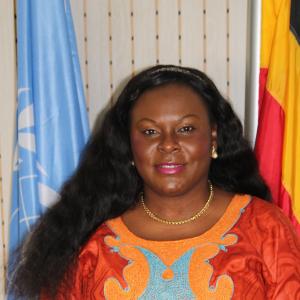Remarks at Launch of the Council of Traditional Leaders of Africa (COTLA), Uganda Chapter
COTLA aims to create pathways through which Traditional and Cultural Leaders can engage more constructively to drive transformation.
Your Royal Highnesses
The EU Head of Delegation
The Minister of Gender Labour and Social Development
Representatives and Leaders of Cultural Institutions in Uganda
Colleagues from the United Nations
Ladies and Gentlemen
On behalf of the United Nations System in Uganda, I would like to welcome you all to this launch of the Uganda Chapter of the Council of Traditional Leaders of Africa which is taking place as we mark the 16 Days of Activism around the world to end gender-based violence. This year the 16 Days of Activism campaign is focusing on amplifying the call for global action to bridge funding gaps, ensuring essential services for survivors of violence during the COVID-19 crisis, strengthening prevention efforts, and enhancing collection and use of data that can improve life-saving services and dignity of those affected.
Today, we launch a partnership to harness and amplify the voices of Traditional and Cultural Leaders in Uganda to contribute towards the Pan African Vision of an “integrated, prosperous, and peaceful Africa” that respects the human rights of girls and women. Our collective aim is to create pathways through which Traditional and Cultural Leaders can engage more constructively to drive transformation and eradicate negative cultural practices, customs and traditions. We are celebrating the role of Traditional and Cultural institutions in the fight to end domestic violence, child marriage, female genital mutilation, and other harmful practices.
This partnership with COTLA is centred around the concept of ‘Obuntubulamu’ in Uganda, which acknowledges our shared humanity. It is our hope that, this concept will inspire a much needed inter-generational transfer of knowledge and wisdom that will help to promote social cohesion, self-esteem, and the advancement of the Sustainable Development Goals promise of leaving no one behind. Thank you for the work you do every day to address the harmful cultural and societal norms that perpetuate violence and harmful practices. Yet, there is still a lot of work to be done. Uganda still has gender stereotypes and traditional practices that marginalize women and girls, jeopardizing their health and prevent them and their families from achieving their full potential.
Before COVID-19, violence against women and girls had reached pandemic proportions with 243 million women and girls having been abused by an intimate partner globally in the past year and less than 40 per cent of women who experience violence reporting it or seeking help. Uganda is no exception, 56% of women experience spousal violence and 49% of young women were married before the age of 18. Reporting rates are low and nearly half of the country believes that a man is justified in beating his wife for specific reasons. These alarming statistics have escalated during COVID-19, we have a collective responsibility to reverse this trend. In every culture we celebrate life, in each of our societies we also celebrate its members, in the current global environment with the onset of COVID-19 the celebration of life has become even more important. Please join me in observing one minute of silence for all those we have lost during the pandemic.
Before I conclude, I wish to thank the European Union for its ongoing support through the Spotlight Initiative to Eliminate Violence Against Women and Girls in Uganda, and globally which has enabled today’s launch and support for the Uganda COTLA Chapter. It is my hope that the Uganda COTLA Chapter will reinforce partnerships with existing initiatives with Traditional and Cultural Leaders around SDGs. I would like to take this opportunity to recognize the existing partnership between the UN and seven Cultural institutions in Uganda around the concept of Ubuntubulamu as a pathway for achieving the Sustainable Development Goals. I also wish to recognize the leadership demonstrated by Cultural Leaders in the fight against HIV/AIDS, in promoting awareness of climate change and most recently in promoting positive masculinity. I invite the Uganda COTLA Chapter to join the UN, the Government and other non-state actors in the implementation of an urgent initiative, the National Initiative for Civic Education in Uganda (NICEUG) which today is having an operational launch in Gulu in response to growing tensions in society including hate speech. I would like to emphasize that hate speech is a menace to democratic values, social stability, peace and sustainable development. As a matter of principle, the United Nations must confront hate speech at every turn. Tackling hate speech is crucial to deepen progress across the SDGs by helping to prevent conflict, atrocities, terrorism and to end violence against women and other human rights violations. We cannot attain development without peace, hence we have a shared responsibility to promote peaceful, inclusive and just societies. It is my hope that COTLA Uganda will become an active member of the stakeholders committee in NICE-UG and by so doing leverage your leadership to ensure that hate speech does not escalate into something more dangerous. Together we can redefine social norms and values, transforming patriarchal masculinities and reshaping our moral code of conduct to ensure the dignity and safety of all citizens regardless of gender, age, ethnicity or religion.
On behalf of the UN in Uganda, I pledge our continued support through the UN Sustainable Development Cooperation Framework (UNSDCF 2021-2025) as we embark on this journey which is aligned to the National Vision and African continental aspirations. Congratulations and thank you for your attention.
Speech by





